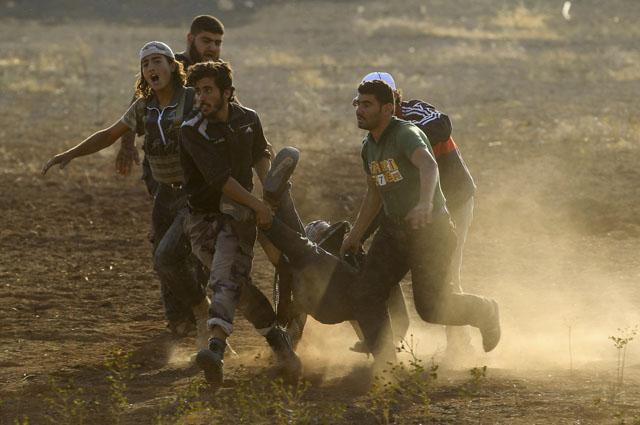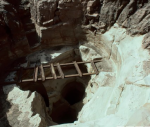You are here
US has no plans to expand military presence in Jordan — Jones
By Khetam Malkawi - Jul 02,2014 - Last updated at Jul 02,2014

AMMAN — Washington is observing the situation in Iraq carefully and is in favour of a political solution for the unrest there, according to US ambassador to Jordan Stuart Jones, who is moving to Iraq soon.
“We are watching the situation in Iraq very closely just as we have been watching the situation in Syria very closely. It is a great concern for us,” Jones told reporters at a round-table meeting on Tuesday.
“We have been encouraging the [Iraqi] government to reach out to various political groups and to reach a broader consensus, and to isolate the terrorist threat,” he added.
“The US definitely supports a unified Iraq.”
Of course, “we have an interest in Iraq and we have a very important interest here in Jordan,” Jones noted.
The ambassador, who has been serving in Jordan for three years, said he keeps coming back to President Barak Obama’s statement last year that the United States will stand by Jordan under any circumstances.
Asked about the possibility of increasing US military troops in Jordan within the current circumstances and the regional threat, the ambassador said there is a small US military footprint here and Patriot missiles, but “there is no plan to expand this today.”
“We don’t have any troops at the borders; we have a training mission in Zarqa and there is no plan to expand any of that today,” Jones reiterated, explaining that the US troops conduct joint training with the Jordan Armed Forces in Zarqa “to raise the capabilities of Jordanian forces”.
Region
Meanwhile, the diplomat said that Jordan has not been suggested as a place to train Syrian fighters in a recent proposal to the US Congress.
He explained that the US government is asking Congress for $500 million to support “the moderate opposition” in Syria.
“We are [going to] have to figure out who wants to work with us, what kind of commitment they are willing to make. This is part of the process,” Jones said.
“In the documents that the White House has referred to Congress, there is no reference to Jordan at all,” he stressed. “Any reports suggesting that Jordan is the destination are just unfounded.”
Despite the proposal to train the Syrian opposition, the US still believes that there is a possibility for a political solution, and “we think the only solution for Syria is a political one.”
However, providing training for Syrian opposition forces, according to Jones, is needed to support those groups that are not part of the radical Islamic State of Iraq and the Levant [ISIL] or the Al Qaeda-linked Jabhat Al Nusra to defend themselves and also “be a buffer for the other countries in the region, and to prevent ISIL from going to other countries of the region including Jordan, Lebanon and Turkey”.
Turning to the Palestinian-Israeli conflict, the ambassador said US Secretary of State John Kerry has not given up on the peace process.
“The US has no choice; we have to support the peace process, to continue to support the two-state solution.”
Economy
Speaking about ties with Jordan, Jones said there have been many positive developments, “just in the last few weeks”.
Last week, the government issued $1 billion worth of US-guaranteed eurobonds in New York.
According to Jones, this is the second loan guaranteed by the US government.
The US guarantee will allow Jordan to access affordable financing from international capital markets, ensuring that the Kingdom can continue to provide critical services to its citizens as it enacts transformative economic reforms and hosts more than 600,000 Syrian refugees.
“We are the only country that gives Jordan direct bilateral cash assistance to help address the refugee crisis,” the ambassador said.
The US gave Jordan $1 billion in 2013, with $200 million of the total as direct cash assistance, the ambassador noted.
“This year will be even more than that,” he told the press.
Impressions
Jones shared also some of his impressions about the Kingdom as he concludes his mission.
“I feel blessed for being here in Jordan over the past three years; we have seen a lot happening over these years,” he said.
“When I got here, the big story was the Arab Spring and what would the effect... [be] on Jordan but it is clear from the beginning that Jordan had sort of responded differently than other countries of the region,” Jones said.
“You had demonstrations, but your police provided water for the demonstrators; you have [the Muslim Brotherhood], but they are part of the political process.
“But then as things change in the region, what I’ve seen is that Jordanians are really coming together and showing solidarity and support for stability here,” the outgoing envoy added.
The most important crisis was the Syrian refugee influx, he said, with over 600,000 Syrian refugees in the Kingdom, only 20 per cent of whom are in official camps while the rest are living among host communities.
“We have so much respect for the generosity of the Jordanian people and receiving these refugees... I have been to those communities; I know the burden that refugees are putting on these communities,” Jones said.
The international community has a huge obligation to support Jordan in this regard, he noted.
In April, Obama nominated Alice G. Wells to be the new ambassador to Jordan. She has been cleared by the Senate Foreign Relations Committee but is awaiting the approval of the US Senate.
Related Articles
No solution to the Palestinian-Israeli issue is going to be at the expense of Jordan, a US envoy stressed on Wednesday.
The United States remains deeply committed to providing the kind of life-saving assistance needed by the Syrian people and also to alleviating the burden on host communities in Jordan, a US official said on Thursday.
Through refusal to be part of any plan to host the training of Syrian rebels, Jordan sends a message that it only seeks a political solution to the Syrian crisis, an official said on Sunday.















